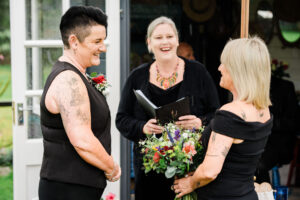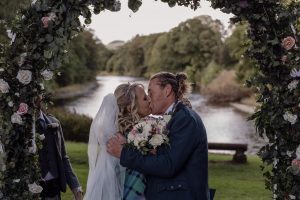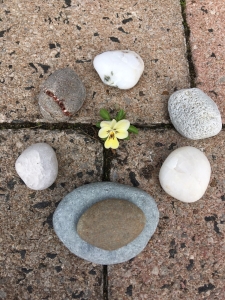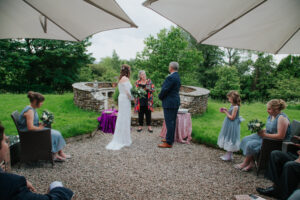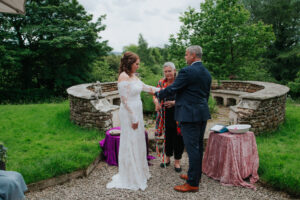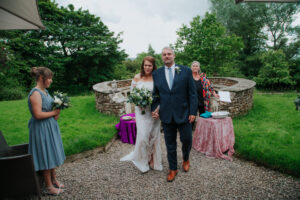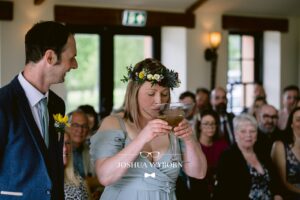At this time of the year, shops are filled with fake spider webs, witches’ costumes, cauldrons, rubber frogs and an assortment of ghoulish items from jelly eyeballs to skeletons, and the ever-essential candy. For many children, Halloween is associated with knocking on the doors of strangers and receiving sugary sweets. This ancient festival has become known as a time to ignite people’s fears about the Underworld.
Halloween, however, was traditionally a festival which honoured the wise grandmother, otherwise known as The Crone. The Goddess is honoured by her three aspects: maiden, mother, grandmother. At Samhain (All Hallow’s Eve) it is the Grandmother (Crone) who takes centre stage as she asks that we use this time to look back over the year and go inwards to learn what will make us a better person in the coming year. It is a time of reflection, transformation and renewal. As Samhain, Festival of the Wise Grandmother, befits the season of Autumn, it is a time to let go and release anything that does not serve us.
What was beautiful and symbolic of the great feminine, such as the Crone’s cauldron representing the womb of the Great Goddess, has been bastardised into ‘evil witches on broomsticks casting dangerous spells’. In Britain, the tradition of children trick or treating originated with asking for donations to help the poor. In Celtic tradition, Hallow’s Eve (renamed as Halloween by the Christian Church) is the time which signifies the end of Summer (Samhain; pronounced sow en). For Celts, this is the beginning of the New Year.
The Saxons called it Winter’s Eve. The ancestors were honoured at this time of year, and it was believed by many cultures that the ‘veil’ between this world and the next was thinnest and therefore an ideal time for communication between the living and the dead. This is certainly my experience.
How can we teach our children to celebrate this tradition in a way which is symbolically rich and meaningful beyond the commercialisation of modern-day Halloween? There are many ways, such as making a special meal and serving a plate for the unseen guests.
It could be gathering unneeded items from the home, such as outgrown clothes, food staples and toys, and giving them to charity (the cycle of Scorpio is a perfect time for letting go).
Making a small altar with photos of your ancestors, and lighting a candle, allows you to create a focal piece in your home. In our family, rather than carve scary faces into pumpkins, we have traditionally cut love hearts so that the light of love shines from our windows. I taught my children, when they were young, the origins of the carved pumpkin: Irish immigrants used turnips, and introduced this idea in the USA in the 18th century.
The Law of Attraction is clear: we become what we focus on. Do we teach our children about fear and negative energies, or do we demonstrate love, and that death is a doorway to another world; and that there is nothing to be frightened of? We can educate our children (and friends) about the history of Halloween, and how it began more than 2,000 years ago as a way of honouring the Crone as well as the end of the harvest season. Her archetype, after all, is that of: you shall reap what you sow. She asks us, our wise grandmother, to take responsibility for our actions.
A Samhain Altar
There are countless ways to celebrate Samhain in your home. Beginning with a simple altar is a great way to start. Use colours and symbols of the harvest season, such as orange and black. Those of us who celebrate earth-based spirituality use black because it represents the cape of the Wise Crone, and the waning Moon. It is symbolic of the dark Earth―the underworld; a type of womb―in which seeds will gestate during the long dark Winter.
We make full use of harvest foods and plants, such as apples, acorns, rosehips, pumpkins, corn, pomegranates and marigolds. On the altar you may find beeswax candles, a cauldron, and Autumn leaves. Mugs may be filled with apple cider or warm honey mead.
On your altar, you can add photos or heirlooms of your ancestors, and invite them to meet you at the veil. Of course, in some homes the ancestor altar is on display all year round.
Sharing the Feast
When creating your Samhain feast, include a place for your ancestors and ancestresses. Just a spoon of food and a mouthful of beverage will suffice. It’s symbolic. Some families leave a bowl of porridge or soup by the hearth, or a candle in the window, while others place an empty chair by the woodstove. These acts are said to guide ‘hungry ghosts’ to comfort, and that humans will be blessed by their interactions with these wandering spirits. This is the perfect opportunity to teach your children about their family tree and ancestral history. If you have letters, photos or books from your ancestors, share them and talk about what they mean to your family. If you don’t have any items, you can write the names of ancestors on paper to place on your altar. To contact your ancestresses and ancestors, close your eyes and be mindful of your breathing. Use this time to ask yourself: who am I?
We are a collection of cells passed down from many, many people in the family line. We have their strengths, their weakness, and we house their failures and their dreams. The Festival of the Wise Grandmother is a time to honour the past and the present, and to consider what we are creating in our future.
I am the daughter of Angelika and Albertus,
granddaughter of Minna-Marie and Dieter, and Liselotte and Erwin.
I come from a long line of people who lived in the cold of Northern Europe: Vikings, shipbuilders, seafarers, mothers, craftsmen and musicians. I come from men and women whose names I do not know, but I do know they were: strong, pioneering, loving, creative, and held family as sacred.
Keep speaking aloud, telling your family story. If there are tales you know, verbalise them. You can ask the ancient ones to guide you on your life’s journey, and to protect you and your loved ones. If you feel you’re carrying family wounds, ask to be freed from them. If you wish to be instrumental in healing wounded archetypes in your lineage, then ask how you can experience and release these stories so that you and your descendants may find and write their own script.
Not everyone in our lineage is someone we wish to be connected to, but with love and forgiveness we can move forward, and in doing so, we free the energy of that person, too.
Use this time to think about your life, and what transformations you’ve undergone. You might choose to meditate, use runes, or practise divination with tarot cards. Perhaps you’ll write down your dreams, or take a solitary walk in the woods and listen to the night owl beneath moonlight.
A phoenix ceremony goes hand in hand with any celebration of Samhain. Review, release and let go. That is the message from the Wise Grandmother. If you have a patio or garden where you can create an open fire (even in a cauldron or small contained pit), use this to write down old habits or negative things you wish to release from your life to release.
Be clear: Samhain and Halloween are not meant to be negative, fear-inducing or about black magic, but quite the opposite. Perhaps those who were instrumental in changing its pure meaning were afraid of the empowerment and the strength of women?
Do feel free to share your positive Samhain and Halloween experiences. Perhaps you could invite friends to take a mindful walk in woodlands near your home. You could make a journey stick, collecting seasonal items from Nature when out walking, to share the story of where you’ve been.
Costumes are a popular part of the modern- day Halloween. According to Samhain tradition, to wear a costume or mask during this time would help to distract wandering spirits from calling you to the Otherworld before your allotted time. Tradition also suggests that it was a way of absorbing the strength of the creature you were imitating. It was common, too, to make noise using hands or drums to interrupt daily human noise. This created a portal to the Otherworld which enabled spirits to make contact and whisper messages to the living.
As a family, you could visit the local cemetery (even if you have no loved ones there), and leave an offering, such as water, herbs, flowers, seeds, bulbs or gemstones.
With your family, you can offer a prayer of gratitude:
Thank you dear Earth
for all that you have given us so bountifully this season.
We open our arms to the Sacred Darkness.
Take your spicy mead or cider, and make libations to Mother Earth, as symbolic of the Wise Grandmother.
We have gathered the harvest,
and Winter is coming.
We give thanks.
If you have a Goddess symbol of the Wise Grandmother, place it on your altar. You might like to make ink art or create dreamcatchers as part of your Halloween celebrations.
At the heart of any ritual and celebration which honours the Earth and her seasons is the use of fire as a symbol. Samhain and Halloween are no different. Fire reminds us that we’re in need of light and warmth. It invites introspection as we draw nearer to the flame.
Make a Samhain wreath using grain stalks, nuts, apples, leaves, conkers and rosehips, and place it on your front door.
Ensure your garden is tidy before All Hallow’s Eve so that it may rest peacefully for the Winter.
Honour the darkness by lighting candles, or celebrating with a bonfire. The light of fire is enhanced by the sheer darkness of night. The light reminds us that there is life in the Underworld.
Press flowers in old books.
Plant bulbs. As you bury them in the dark, moist and fertile womb of Mother Earth, offer a prayer to the Goddess of the Underground. Write your wishes on paper, and bury them with the bulbs.
Harvest your produce, and store well.
If you are celebrating Samhain with friends, hold hands and stand in a circle around your bonfire. Invite the ancestresses to be with you. Feel the power as each of you verbalises your connections to the Otherworld.
Wear black during Samhain to celebrate the season and all it represents.
Make spirals or hearts from seeds and nuts.
Sit outside at twilight and listen for the voices of your ancestresses in the wind.
Take a solitary walk at night time to feel the sense of the season.
Practise ecological awareness, and give back to Earth rather than using products made from crude oils or ancient sunlight.
Veronika Robinson comes from a long line of white witches (the ones they were never able to burn). She is a ceremonialist, author, celebrant trainer, and second-generation astrologer who is happiest walking in the woods or tucked up by the woodstove.
If the thinning of the veil inspires you to have a reading with her, such as an Astrology or Angelik Reading, visit here.




















